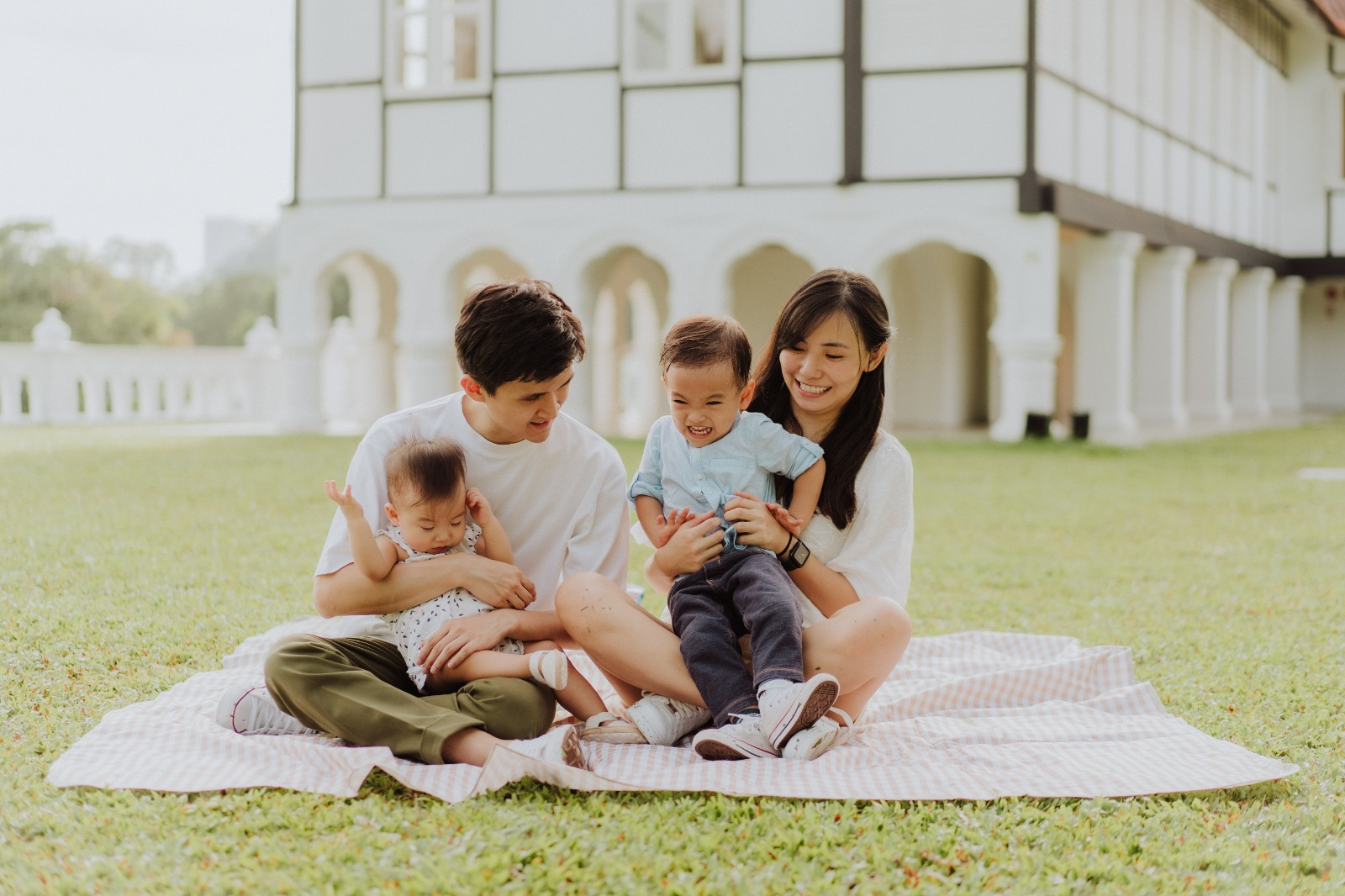Top image: Amanda Ong
“I call it my modern village,” Amanda Ong, 30, the founder of babysitting app Aunty, tells me over a Zoom call. Aunty is the first of its kind in Singapore, where it helps to connect parents to potential babysitters with a simple swipe of their fingers.
With a pool of pre-vetted sitters, the app presents as a contemporary panacea to the last-minute scramble parents know all too well when either pre-arranged help falls through or when your child falls sick. Indeed, raising children does take a village, and with more grandparents (the usual caregivers of young children) remaining in the workforce, parents have to find alternatives and ones they can entrust their children to as well.
ADVERTISEMENT
Besides taking away the stress of looking for suitable and compatible babysitters, Aunty has also allowed parents to take better care of themselves and, in turn, become better parents and spouses.
Expensive agencies and dodgy Facebook photos
As a mother of two young children, Amanda sees and empathises with the many joys and heartaches modern parenting entails in Singapore. After all, Aunty was born out of Amanda’s struggles with finding good help when she found herself at the beginning of Chinese New Year with a newborn, a toddler, and a cancelled nanny.
“The nanny said, why is your baby born on the first day of Chinese New Year? She should be born in March.” Amanda says, “I can’t time this, right?”. Amanda had just sent her helper home with a cranky two-year-old, a newborn, and a severe lack of sleep; it was undeniably stressful and tiring.
Naturally, Amanda tried the usual route of going to babysitting agencies. “Agencies were really expensive; they quoted me S$4,700 for a confinement nanny during Chinese New Year,” says an exasperated Amanda.
“And they kept adding things like a special package of S$300, last-minute notice charge of another S$100, and the customary red packet,” says Amanda. Along with the exorbitant charges, there was the rigidity of babysitting and confinement nanny agencies where you couldn’t replace the assigned even if they weren’t a good fit.
Turning to the internet, Amanda went on Facebook in hopes there would be a more viable option. However, the results were a little unsavoury, to say the least.
“Random people DM-ed, and I didn’t know who these people were,” says Amanda, “plus, there are no reviews. You don’t know if the experience is what they say they have. Sometimes, they don’t even have a profile picture or their photo is so dodgy,” shudders Amanda. With the spate of unfortunate and tragic babysitting incidents in the news, there is a cloud of anxiety and uncertainty surrounding babysitters and confinement nannies.
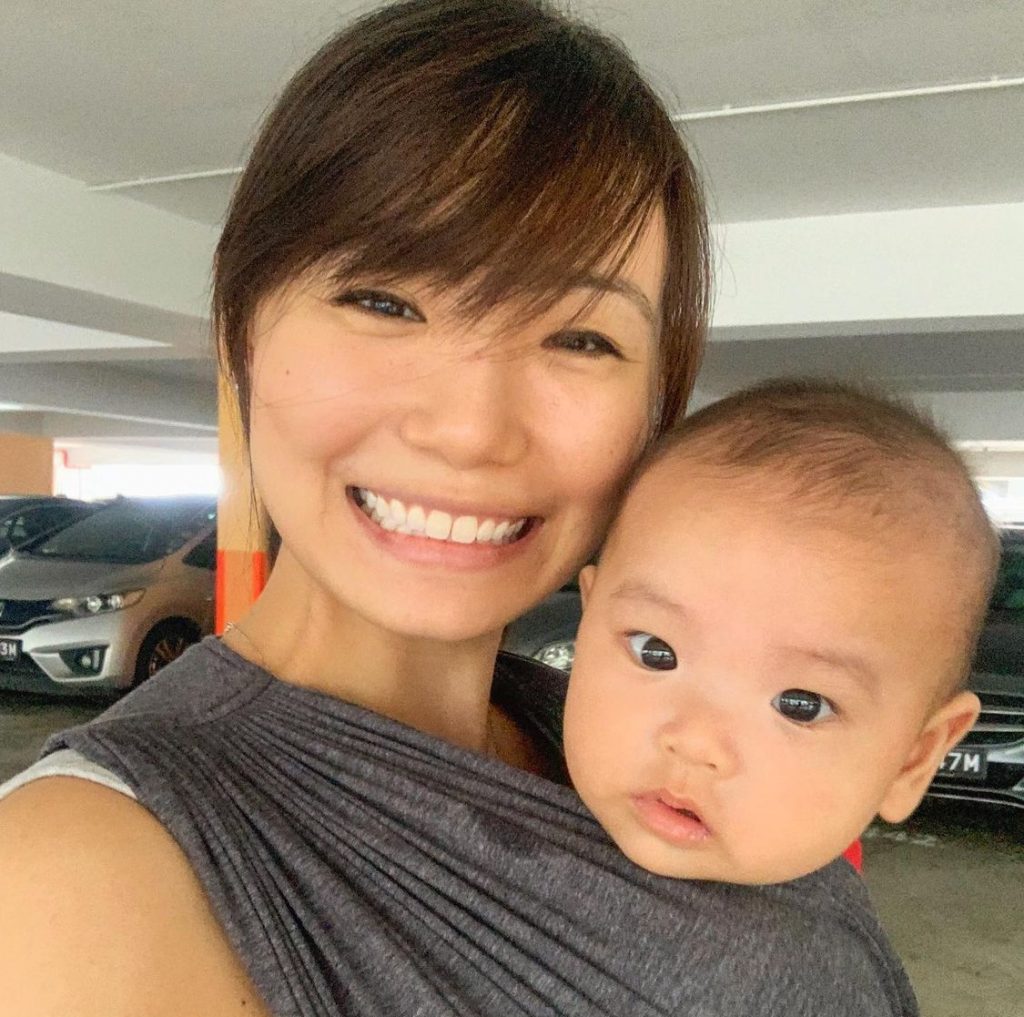
“After you’ve just given birth, they’re so little; I mean, if they were seven years old, maybe it might be alright. But, seeing as they are so small, I didn’t want to take that risk,” stresses Amanda.
Amanda reached a tipping point when she was inundated with articles about mothers grappling with postpartum depression. “I thought that it would be helpful if somebody could just reach out to her (the mother in the article). Or somebody could just give her a break,” Amanda tells me.
“When you are in your thirties to your forties, you’re trying to build a successful career and a family—trying to juggle all these things at the same time and with Covid-19? It can be so exhausting,” relates Amanda.
Amanda figured there were so many mothers around her; there had to be an easier way to connect with them. With this in mind, Amanda came up with Aunty to bridge the babysitting gap and help parents find immediate and safe relief.
ADVERTISEMENT
Babysitting as a unique vocation
As Amanda puts it, successful babysitting hinges a lot on trust, and this sometimes fragile relationship is not easy to foster and can be shattered instantly.
“Babysitting is unique because it is quite informal. At the same time, it’s also very personal as it involves children. You definitely need to build that trust there,” explains Amanda. “You can’t have a certificate for babysitting, you know, there is no such thing as ‘certified babysitter’,” laughs Amanda.
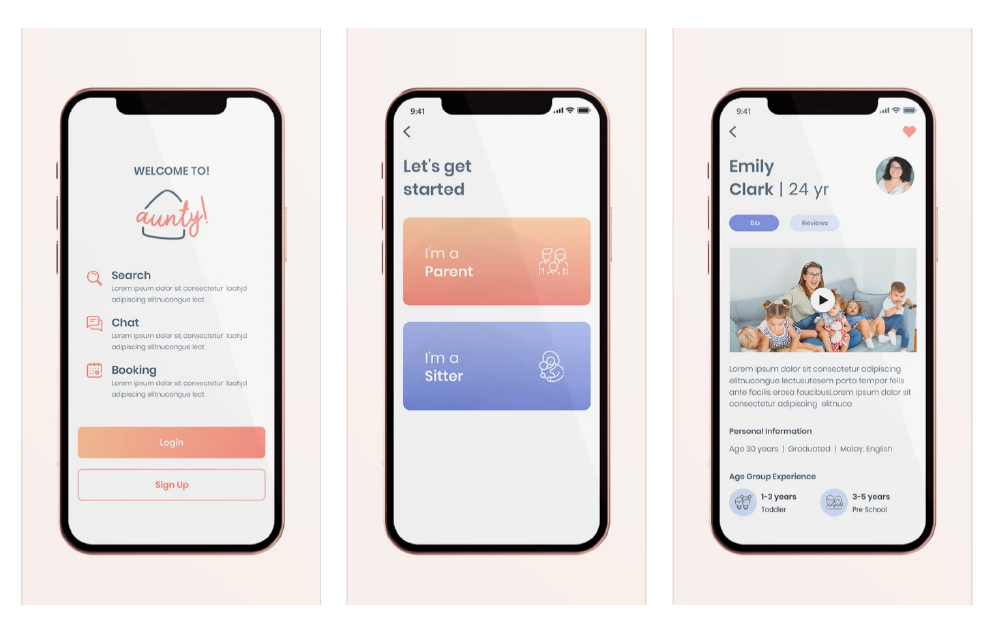
Still, this does not mean Amanda does not have stringent checks on Aunty. Sitters on Aunty are pre-vetted; this means Amanda takes down their NRIC and verifies their identity. Then, potential sitters have to indicate if they have any childcare-related experience and CPR training on the application forms.
“If they don’t have any experience at all, or it’s not what they say they have, I don’t approve of them on the platform. It’s a closed platform, so it’s not like anybody can just join.” She also does a phone interview to get a further sense of who they are and what kind of experience they have.
Since she is the only person managing the app, Amanda has spoken to all two hundred sitters on the app herself. She stresses that Aunty is a platform and not an agency, so they do not train the sitters but do their best to perform extensive checks.
As a bit of value-add and assurance, Amanda also supplies her sitters with a small toolkit with essential numbers and what to do in emergencies.
From students to nurses to grandmothers
With such an expansive definition of what it means to be a babysitter, Amanda used it thoroughly to her advantage. She amassed a diverse set of sitters ranging from fellow mums, university students, tuitions teachers, pediatric nurses, and grandmothers who wouldn’t mind having a couple more grandchildren for the afternoon.
Other than giving parents a break, Aunty has some babysitters who are trained nurses to assist mothers in more complicated medical procedures such as tube feeding. Tube feeding happens when infants do not have enough strength or muscle coordination to breastfeed or drink from a bottle.
This procedure can be done at home but as one can imagine, inserting a tube into your month-old infant is a rather tricky and intimidating undertaking for new mothers. With Aunty, some babysitters are trained nurses who can assist mothers with tube feeding for their babies.
As someone who used to work in HR, Amanda saw first-hand how many jobs were cut and how tough the job market was, especially for fresh grads during the first few waves of the pandemic. With Aunty, she can create opportunities for her sitters and tide them through this challenging time is especially rewarding and something she feels passionately about.
ADVERTISEMENT
For some, working as a babysitter is a way to supplement their income. Babysitters on the app can set their rates, and it ranges from S$20 to S$25 per three-hour sit. For others like retiree Helen Lim, 55, it has given her life newfound joy and purpose.
After chancing upon Aunty in an article, Helen thought she could better use her spare time caring for her aged mother. Her babysitting jobs are primarily on weekday afternoons, for an average of four hours per day. “Besides diaper changing, feeding, and napping, every moment spent with them has been exciting, joyous, enriching, and memorable,” pushes Helen.
“Joining Aunty has given me brighter perspectives to my early retirement years. They have been more meaningful, productive, and energetic. Being on Aunty has also given me the flexibility to fulfil my commitments and achieve a work-life balance,” Helen continues.
Besides giving retirees like Helen’s time more meaning, Aunty shines the most because it empowers mothers and allows them to tap into the network of fellow mothers.
Then, there is Mariam*, a mum to two adult boys and a cancer survivor who is currently in remission. While Mariam wants a full-time job, it is still too taxing for her at the moment. As she loves children, being a sitter on Aunty works in her favour. This way, Mariam has a job that does not compromise her health, and she gets to interact with children.
A village for special needs kids
Amanda shares how it can be daunting for some stay-at-home mothers to enter the workforce after 20 years of being at home; being part of Aunty can help these mums ease into new routines without feeling too intimidated.
Besides providing a safe space for mums to re-enter the workforce, Amanda points out that Aunty also caters to kids with special needs. These sitters come in various forms, either as specially trained individuals with skills to handle special needs kids, siblings of those with similar needs, or even mothers of special needs kids whose own children have grown up and do not require round-the-clock care.
Amanda shares how a mother with a special needs child was often rejected by other agencies and platforms before she found Aunty. With Aunty, she managed to book six sessions—a stark difference to the closed doors from before.
How to be better mummies and daddies
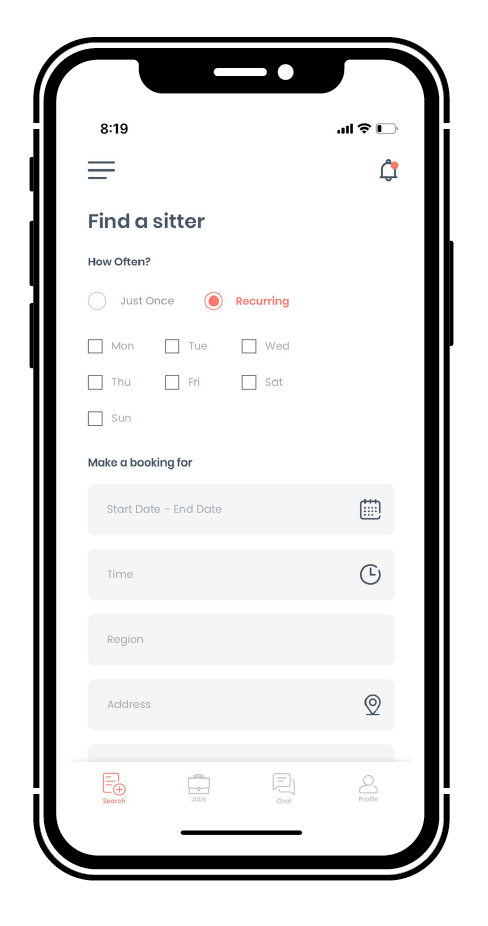
With a newborn in the house, ‘me’ time is quickly relegated to the background, especially for new mothers. After all, adapting to a new human who constantly needs your attention is demanding to say the least—“because when a baby is born, a mother is also born”.
While mothers bear the brunt of these new changes, Amanda points out that the newly minted fathers also have a tough time adapting and might be left feeling a little neglected. The usual stress from work is compounded with all the changes from having a new baby.
“Their wife is not having a great time or is struggling, and the baby is crying,” describes Amanda, who had a few depressed daddies reach out to her on Aunty for some help and temporary respite.
With the help of Aunty, new mums and dads can continually build and strengthen relationships amid all these new changes.
“The other reason I’m doing this is also that I think a lot of couples should invest in their marriage,” asserts Amanda, “you know, just to have a conversation, have a nice meal, feel like you’re dating again. It’s so important—a lot of people lose that spark”.
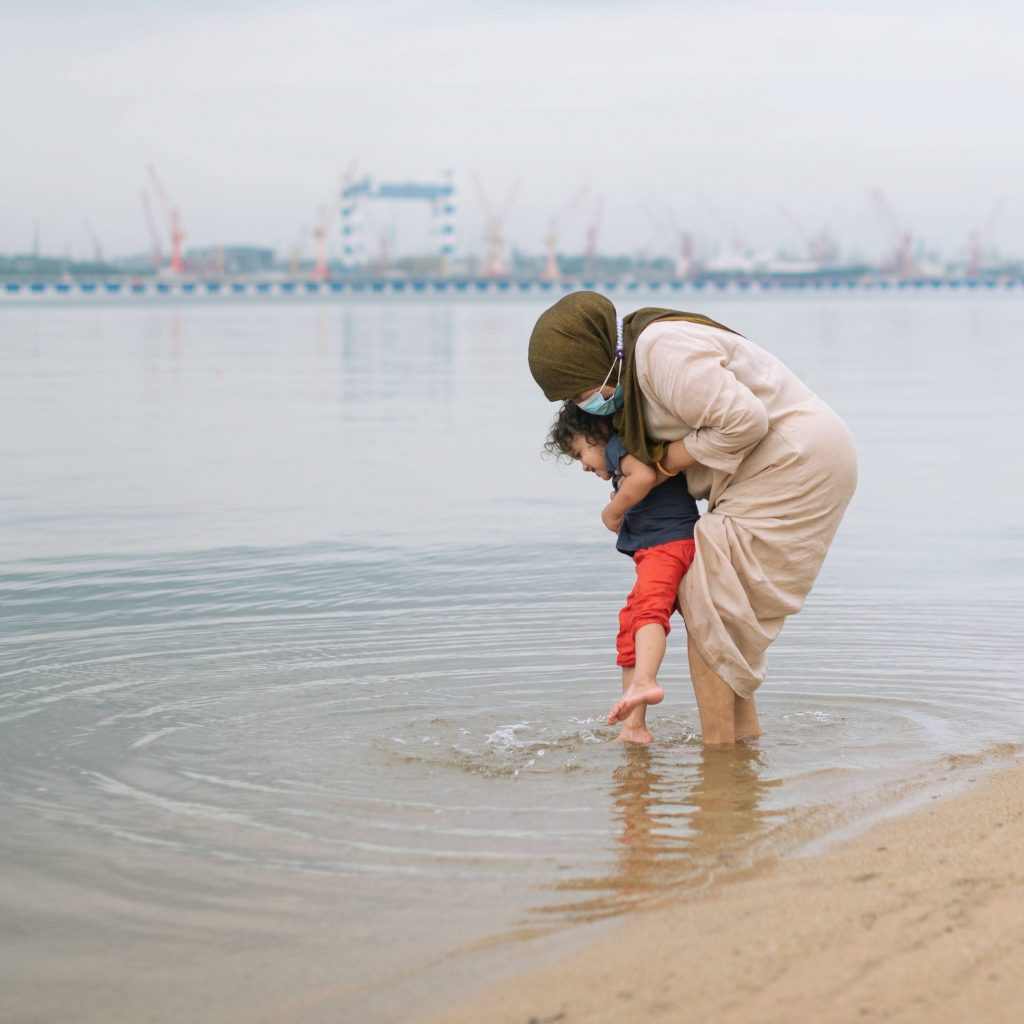
Single parents and asking for help
Besides couples, the help Aunty provides has proven invaluable to single mums like Betty*. “As a single parent, you tend to have to be both mother and father, on top of your regular job,” says Betty.
With the pandemic, it has been tough on Betty’s mental health, with her attention split between focusing on her job and making sure her three-year-old son doesn’t get up to any mischief. It’s a task she finds both mentally and emotionally draining.
“Aunty has allowed me to take a break from parenting for just a little while and focus on things that I need to do. Like catching up on some much-needed work or something as simple as having some peace while eating my dinner or shower. I don’t have to worry that the little one is creating chaos elsewhere,” Betty tells me.
More than that, seeing how her babysitter interacts with her son allows her to learn better ways to better communicate with her son. “It has greatly improved our parent-child interaction and at the same time reduces the overall stress that I feel as a parent,” says Betty.
As a single parent in Singapore, this status often comes with prejudices and societal expectations, something Betty is all too familiar with. “If you are a mother, society expects you to be able to do everything and put your child first before herself, thus if she is unable to do so or were to seek external help, she is not considered a good mother or is just plain lazy,” says Betty.
“However, what people don’t see is the huge burden that is on our shoulders from all the nitty-gritty issues that we need to oversee from school to work to household chores and parenting,” explains Betty. With Aunty, all of these pressures are greatly alleviated, and for Betty, she sees receiving help as a teachable moment where her children are taught there is no shame in accepting help when needed.
As demanding as it is to be a single parent in Singapore, it can also be enriching. “With modern parenting in Singapore, there are support groups and resources that you can always rely on when you need help in dealing with various challenges from three-year-old meltdowns to the inadvertent uttering of bad words,” remarks Betty.
“As parents, we are role models and try to lead by example to our kids. If we are not able to take care of ourselves mentally and emotionally, we are teaching our children that it is alright to ignore our health for the ‘greater good.’”
*Name has been changed to protect the privacy of profiles.

